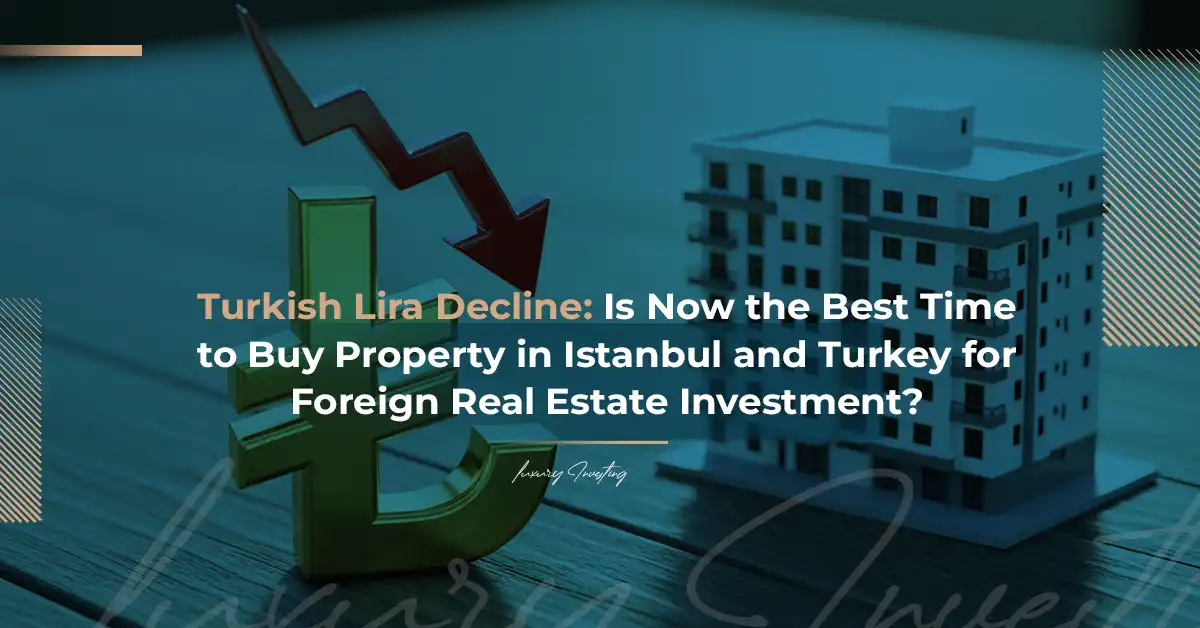
Turkish Lira Decline: Is Now the Best Time to Buy Property in Istanbul and Turkey for Foreign Real Estate Investment?
Table of Contents
- Impact of the Turkish Lira Decline on Property Prices for Foreign Investors
- Istanbul Leads the Way: Why It Is the Top Destination for Property Investors?
- High Investment Returns Compared to Competing Markets
- The Advantage of Turkish Citizenship for Foreign Investors
- 2025 Outlook: Why This May Be the Best Time to Enter the Turkish Market
- Is Now a Good Time to Buy Property in Turkey?
- How to Choose the Right Property for Investment in Turkey
In recent years, the Turkish market has witnessed significant economic shifts, the most notable being the decline of the Turkish lira, which has opened the door for foreign investors to seize exceptional opportunities in Turkey’s real estate sector. With local and international demand for property continuing to rise—especially in cities such as Istanbul, Bodrum, Antalya, and Ankara—the question arises: Is the depreciation of the Turkish lira the ideal time to buy property for investment?
This article explores the reasons, highlights the benefits, and explains why Turkey’s real estate market has become an attractive environment for investors.
Impact of the Turkish Lira Decline on Property Prices for Foreign Investors
Despite rising construction costs domestically, foreign investors purchasing with strong currencies such as USD and EUR benefit from several key advantages:
- Lower Actual Cost of Property in USD
When the lira declines, local property prices remain relatively stable inside Turkey. However, when converted into USD or EUR, the real cost becomes significantly lower, allowing foreign investors to purchase larger or higher-quality properties within the same budget.
- Increased Purchasing Power
Each dollar or euro now translates into greater value in the Turkish market, meaning that foreign investors can access property options that may have been unaffordable in previous years.
- Access to Luxury Real Estate at Globally Competitive Prices
Compared to international markets such as Dubai, London, or Paris, the depreciation of the lira has made luxury properties in Istanbul and central districts far more attractive in terms of price-to-quality ratio.
Illustrative Example
A luxury apartment in Istanbul that once required a significant investment in USD can now be purchased at a 20% to 40% lower price, depending on the district, development quality, and developer.
Istanbul Leads the Way: Why It Is the Top Destination for Property Investors?
Istanbul continues to cement its position as the most attractive investment city in Turkey—and one of the strongest in the region—thanks to its strategic location, massive infrastructure projects, and high-return investment opportunities.
As the economic capital of Turkey and a global business hub, Istanbul offers an environment rich in opportunities for both local and foreign investors.
- A Strategic Location Connecting Two Continents
Situated between Europe and Asia, Istanbul enjoys a unique geopolitical position that drives strong housing demand from:
Business professionals - Students - Expat employees - Tourists and long-term foreign residents
This consistent demand ensures stable rental returns and long-term capital appreciation.
- Major Government Projects Boosting Property Value
Istanbul has seen rapid growth in large-scale infrastructure developments, including:
- Istanbul New Airport – set to be the largest airport in the world upon full completion
- An extensive modern metro network connecting major districts
These projects directly increase property values, especially in nearby areas.
- High Rental Demand in Prime Central Districts
Many districts in Istanbul experience strong demand for:
Monthly rentals - Annual rentals - Short-term and tourist rentals
Top high-demand areas include:
Başakşehir, Maslak, Bomonti, Kağıthane, Beyoğlu, Bakırköy, Zeytinburnu, and Sarıyer
These districts are known as commercial and residential hubs, offering universities, hospitals, international schools, and modern residential projects.
- Rapidly Growing New Development Areas
In recent years, several emerging neighborhoods have become major investment zones due to their modern infrastructure and strong future potential, such as:
- Göktürk (luxury living near Belgrad Forest)
- Ataköy (coastal and near the airport)
- Kartal (the new business district on the Asian side)
These locations are currently among the most attractive for medium- and long-term investment.
High Investment Returns Compared to Competing Markets
Turkey offers some of the highest rental yields in the region, with averages of:
- 6%–10% in Istanbul’s modern developments
- 8%–12% in coastal or tourist regions such as Bodrum and Antalya
With rising long-term demand, property values in USD typically appreciate over the years, making real estate in Turkey a dual-return investment:
(rental income + capital appreciation).
The Advantage of Turkish Citizenship for Foreign Investors
One of the strongest incentives for foreign buyers is the opportunity to obtain Turkish citizenship by purchasing property worth $400,000 or more.
The Turkish Citizenship by Investment Program offers:
- A strong, globally recognized passport
- Citizenship for the spouse and children
- A fast 3–6 month processing period
- The option to resell the property after 3 years
This program has made Turkey a prime destination for investors from the Middle East, Russia, Europe, and Asia.
Investing in Turkey 2025: Real Estate, Citizenship, and the Power of the Turkish Passport
2025 Outlook: Why This May Be the Best Time to Enter the Turkish Market
Based on current market indicators:
- Major government infrastructure projects are continuing
- Local demand is rising due to population growth
- Positive expectations for economic recovery in the coming years
This suggests that current property prices may be the lowest we’ll see before future increases, especially if the lira stabilizes or begins to strengthen.
Is Now a Good Time to Buy Property in Turkey?
Short answer: Yes.
Considering:
- The depreciation of the Turkish lira
- Higher purchasing power for foreign currencies
- Strong and growing demand for real estate
- The Turkish citizenship program
- Strength of tourism and consumption markets
- Large-scale government investments
The current period represents one of the best real estate investment windows in Turkey in the past decade.
How to Choose the Right Property for Investment in Turkey
To ensure a successful investment, focus on:
- Projects close to metro stations and major transportation routes
- Reliable and well-established developers
- Districts with high rental demand
- Ready or near-completion projects (within 12 months)
- Properties eligible for citizenship
Conclusion
The decline of the Turkish lira is not merely an economic event—it is a golden investment opportunity for foreign buyers looking to purchase property in Istanbul or other major Turkish cities. With strong growth prospects in the real estate market and Turkey’s push to attract foreign investment, 2025 could be the perfect time to enter the market before future price surges.
Frequently asked questions
Because buying property in dollars or euros makes the actual cost significantly lower when converted from lira, giving the investor greater purchasing power and the opportunity to acquire better properties within the same budget.
Although prices remain stable in lira, their value in dollars decreases. This reduces the cost of purchasing property for foreign investors by up to 40%, depending on the area and project.
No, developers in Istanbul continue to adhere to high construction standards, and the strong demand for luxury properties drives continuous improvement and development.
Central areas such as Bomonti, Maslak, Kağıthane, Başakşehir, Sarıyer, Bakırköy, Zeynepburnu, and Beyoğlu, as well as developing areas like Göktürk, Kartal, and Ataköy.
Due to its location between Europe and Asia, its advanced infrastructure, and major government projects such as the new airport and metro, in addition to high rental yields.
It ranges from 6% to 10% in Istanbul, and 8% to 12% in cities like Bodrum and Antalya, with the potential for property value to increase over time.








